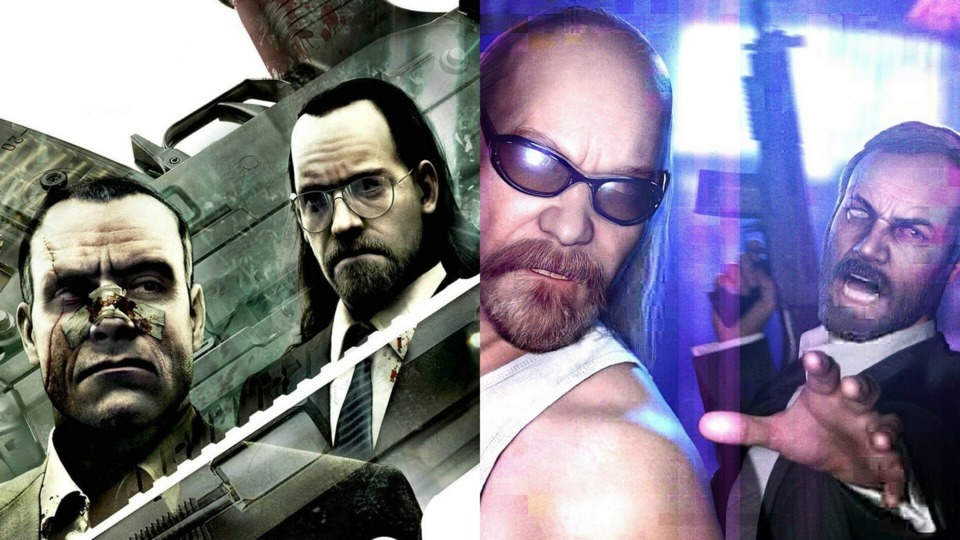
Note: This blog contains spoilers, strong language, strong themes, and disturbing images.
The Kane and Lynch duology is one mired with mixed reviews and controversy, most notably of which was a review by Jeff Gerstmann that led to his dismissal at Gamespot and what would eventually be known as “Gerstmann-gate.” Despite this, there’d a small Kane and Lynch cult following I wasn’t even aware of until Youtube Essayist Jacob Geller released a video titled “Max Payne, Kane & Lynch, and the Meaning of Ugly Games.” So, I decided to pick up these two games and try them out, and boy were they…something to experience. So, here is what I have to say about the games, starting with Kane and Lynch: Dead Men.

The first thing that hit me with this game, more than its depressing music or its Games for Windows Live window popup, is its difficulty options in the singleplayer menu. Instead of easy, medium, or hard, I had to choose between Aspirin, Codeine, or Morphine. All three are pain reducing drugs, but the drug’s strength gets stronger from left-to-right. I didn’t think much of it beyond an interesting naming convention when I first booted up the game, but looking back on it, I think it goes beyond that. This game isn’t asking if I want my experience to be easier or harder, it’s asking how much pain do I want dulled out. Dead Men is already telling me it’s going to be a painful experience, and it’s prescribing me a pain reliever before I even experienced any pain. Does this mean it’s preparing me for a bad game or for what Kane and Lynch will have to endure? I suppose it’s a little of both.
The story follows Kane, an ex-mercenary being escorted to prison when the truck he’s in is suddenly hit. Lynch, another person in the escort truck with Kane, tells him the hit was to set him free. After escaping with Lynch and his mercenaries, he is met by a criminal gang known as The 7, who accuse him of stealing money from them and are holding his wife and kid hostage until they get their money back. From there, Kane, who knows of the money but didn’t steal it, and Lynch, who now acts as Kane’s partner and watchdog, go out to try and retrieve all of the stolen money before time runs out.
When I think about the stories I’ve experienced in any medium, usually there is at least one aspect of the story I root for. Maybe I like the events of the plot, maybe I want to see the villain defeated, maybe I just like the character and feel bad about what’s happening to them. Kane and Lynch: Dead Men has none of that. Nothing that happens in this game’s three-ish hour runtime is in any way positive. Kane is a nihilistic asshole who is no better than the gang who kidnapped his wife, Lynch is a mentally unstable psychopath, and neither are really likable. Every time Kane is downed, an audio flashback plays, and every single one is of a past mistake or regret. Just about every mission and event in this story ends in disaster and a trail of blood, with Kane not being afraid to leave people to die. The plan on getting the money ultimately fails and Kane’s wife is shot right in front him. And ultimately, the game either ends in Kane leaving his allies to die to save his daughter who hates him or Kane trying (and mostly failing) to save his allies who also hate him, and his daughter dying in his arms.

There is no happy ending, nothing ever good happens, and no one in this world is likable, but that is what I strangely love about this story. It’s a shooter story that challenges the notions of a shooter story. Violence begets violence, and while most stories try to steer that ship towards a happier ending, Dead Men steers it in a different direction, going down a more realistic and bloody path that equates to digging a deeper and deeper hole that is hard to climb out of, which I think is fitting considering the fact that there is a scene of Kane digging his own grave at his lowest point. I also don’t think the game goes too hard in the other direction like Hatred, where the protagonist is inherently evil and every action done is done for evil’s sake. Yes, Kane and Lynch are bad people doing bad things, and a lot of innocent people (or at least people who shouldn’t be victims to their violence) are caught in the middle, but I wouldn’t consider their actions evil. They are incredibly unlikable, but The 7 are also bad people who kidnapped Kane’s wife and are also unafraid to get their hands dirty to get what they want. What I find unique with this story and this character is that the game isn’t trying to say that Kane is the good guy or someone who is misunderstood or is even the antagonist. Instead, they say Kane is a bad guy with a lot of regrets living in a bad world, but he is no greater or worse than most of the people he does business with.
One thing I found quite interesting throughout the story are the various characters surrounding Kane. Most of the story revolves around Kane, so there isn’t much to say about Lynch, but just about every character Kane interacts with is negative. He doesn’t have friends; he has acquaintances, and the entire game is him burning bridges with just about all of them. Take the Vaultbreaker for example. Kane asks for his help robbing a bank, but what bit of friendship they had before the robbery washed down the drain when he figures out Kane lied to him about the job, and the mission eventually ends with Kane and Lynch leaving him for dead. Not every character interaction ends with their death, but just about every one ends with them being used up like a resource and Kane ruining all ties with them. Even his relationship with Lynch is no different, as their “friendship” started with Lynch being Kane’s watchdog, and they never really get along throughout the story. Kane belittles Lynch about his mental problems, and Lynch belittles Kane for kidnapping a woman in Tokyo and using her to trade for a briefcase (a plan that ultimately fails when Lynch kills her). Kane will do anything he can to save his family (who also hate him), but in this world, that means leaving a trail of blood and broken relationships behind him.
The game’s story is quite something, but it certainly isn’t perfect. The biggest issue plaguing it is the pace, as the story moves too fast for the game to keep up. One moment, the duo is robbing a bank, and the next, they are in Tokyo kidnapping a woman. The game from beginning-to-end is all over the place in a way that made the story feel incoherent and some of the characters hard to invest into. Also, I think both the voice recording and voice acting isn’t great, and I noticed multiple points where voices would echo despite being in an environment where it shouldn’t. I think there is something to be said about a chaotic plot, but I think this game’s jumping from one place to the next made it too difficult to follow.
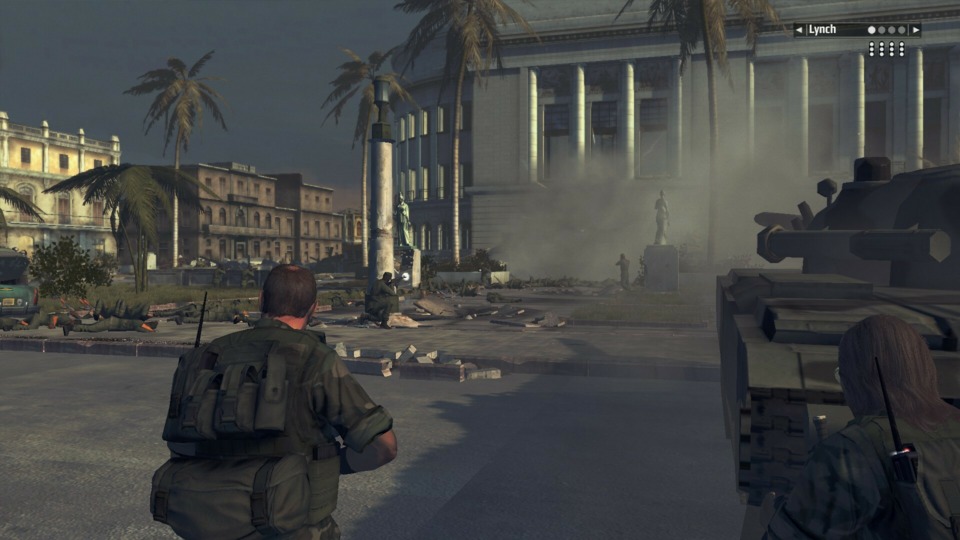
While its story is fast-paced and chaotic, Dead Men’s combat is on the opposite side of the scale, as it’s a rather basic and bland third-person shooter. Shooting feels inaccurate and unresponsive, auto reloading is annoying, auto cover is wonky, weapon selection is limited, stealth doesn’t work, and the gameplay overall is rather buggy. There are a few neat features to the combat like seeing a sniper scope in the bottom corner of the screen if a sniper is about to shoot Kane and the ability to play co-op with one other or give out some basic commands to Lynch if playing solo (neither of which I interacted with unless the game forced me to mark targets for Lynch), but overall there is nothing remotely remarkable about the gameplay. For most other games, all of this would be a cause for concern, but with the context of Dead Men, I actually think it is quite fitting.
One of the first things I tested out in the game was in the first mission when I came across some civilians while cutting through some buildings to get to a getaway vehicle. What would happen if I kill them? I killed a few of them and found my answer: nothing. The game doesn’t end for killing civilians, no message pops up saying I shouldn’t do it, no character berates me for my actions, and it doesn’t even phase Kane himself. In almost every game I’ve played, the game usually acknowledges your violence against civilians. The game ends, a wanted meter shows up, the game deducts money from me, or some other way of punishing me for my actions. Or, on the other side of the spectrum, a game glorifies it, makes commentary about it, or even makes a joke out of it. But this game does neither, and it shows just how brutal this world is. Much like Kane’s wife and kid, innocent people end up right in the middle of it, and they couldn’t matter less to the people who create this ugly world. Shooting them or not shooting them doesn’t matter because they don’t matter, even though they are the most tragic deaths in the trail of blood following the duo. It also makes a later scene where Kane belittles Lynch for killing civilians in a heist rather ironic, though looking back at that scene, I believe Kane was more mad at him for the possible consequence of killing civilians than their actual deaths. A lot of games usually make a big deal out of killing civilians, which is why I think this game allowing it without highlighting it feels significant to me.
As I progressed further into the campaign, I started to realize how the combat’s shortcomings actually fits in with the game. Like I said earlier, the combat is no-frills and bland. There is no arcade score, no upgrades, and no special sound effect for headshots. You shoot at dudes until they limply crumple to the floor, and you keep doing that until credits roll. Nothing about the combat feels fun or exciting, but isn’t that the point? Like the story, Kane and Lynch isn’t trying to gamify or glorify its violence or brutality. I would even argue that this game doesn’t like its violence, but the characters are forced into it to survive. There is nothing satisfying or rewarding about killing people in this game, just like how there is nothing rewarding with the story. Dead Men is a game about presenting a darker but more realistic depiction of a criminal world and what violence and revenge ultimately leads to, and I believe the combat reflects this tone, even if it means sacrificing “fun.”
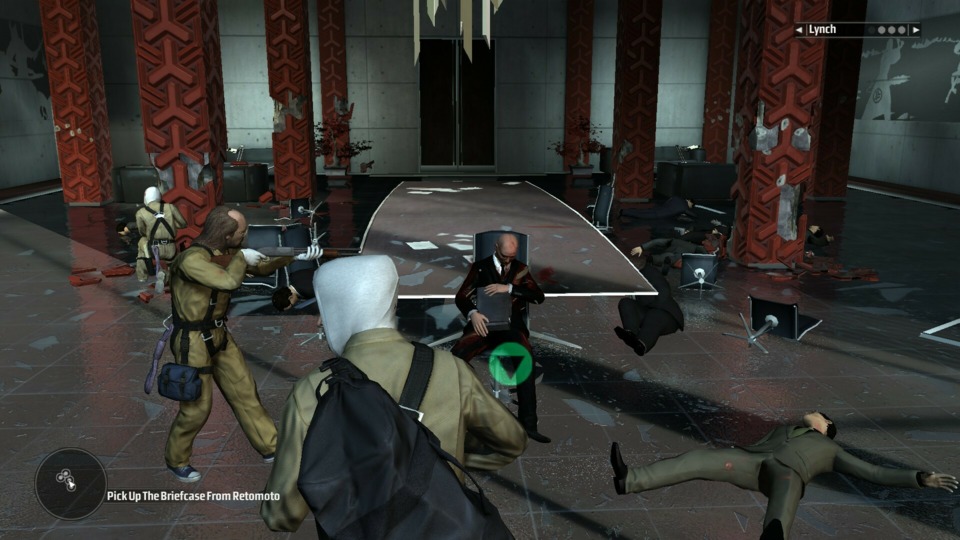
Before I move onto Dog Days, I do want to talk about one of the most interesting scenes in the game. Kane is standing in his own grave, pleading to one of The 7 to have a little more time to talk to his wife and daughter, even though the wife is furious with him. The wish is denied, and Kane’s wife is shot in front of him. Lynch springs to action, and Kane gets out of the grave and beats his wife’s killer to death with a shovel, shouting “You should have let me talk to them!” What I found so fascinating about this scene isn’t the brutality of it, but the acceptance of it. Kane wasn’t mad about his wife’s death, he was mad that he didn’t get to talk to her before she died. He already accepted her death as well as his own because he knows what The 7 is like. This is the world of Kane and Lynch. It’s one where it is easier to accept its brutality than actually fight against it because in the end, the worst that could happen happens, and that is what makes this game stand out in my mind. So with all of that in mind, I jumped right into the next game.

Dog Days is a term used to describe the hottest days in summer, ranging from July 3rd to August 11th. It’s called this as it symbolizes the rise of the Sirius star system, which is otherwise known as the “Dog Star.” Multiple ancient cultures contributed the rise of this star to events in their home land including heat waves, fevers, and so on, though the dates have changed over time because of Earth’s rotation. The most interesting interpretation I found with this star is with the ancient Egyptians, who noticed the rise of this star just before the annual Nile River flooding. While this may sound bad at first, the annual flooding was actually a celebrated event as it brought in rich soil and a majority of the water needed for irrigation in that region. Sometimes this flood would be too large or too small, resulting in either famine or water damages, but it was a necessary evil to deal with for the sake of their survival.
The first thing I experienced when I booted up the game was a first-person POV shot of the backseat of a car and the main menu in the foreground. It travelled down the highway while music on the radio played, and another car was keeping speed. It was just two cars driving down the highway. Leave the game alone for about a minute, and an entirely different kind of cutscene plays. The cutscene bounces back and forth between Kane and Lynch. Kane is in a losing firefight, and all of his men are dying around him while he screams for help and eventually runs for his life. Lynch is living a quiet life, checking his electrical box while talking to a female who I assume is his significant other. The change from a car down the highway (which I later learned isn’t the only one of these mundane POV shots) to this cutscene is just as jarring as the switches between Kane and Lynch. This is the calm before the storm, both for the setting and for Lynch. Even before I clicked on any options or difficulty settings, I knew this was gonna be something.
What I found interesting about this cutscene are the roles the two inhabit. The previous game set up Lynch as this borderline psychopath who, when off his meds, could enact serious and uncontrollable violence including a massacre of innocent civilians in a bank robbery. But it’s Kane who couldn’t leave the life violence. Maybe it’s because The 7 painted a target on his back that he couldn’t quite get off despite them all being dead, but the cutscene that plays has me believing it was some sort of robbery-gone-wrong. The last game had me believing that Kane, while unmistakably an asshole who found burning bridges with others much easier than actually making allies, was someone forced into violence for the sake of his family. He didn’t want violence, but he needed it in order to survive. This cutscene, however, proves otherwise. Diving a little bit further into the game shows that Kane’s daughter is still alive, Lynch is an enforcer for a mob, and the job that brings the two together this time around is their hopeful retirement plan. This tells me a few things. First is that he still has his daughter, but instead of changing his violent ways for both their sakes, he still uses violence as a way of “supporting her” with blood-soaked money. The second is that Lynch hasn’t left his criminal life either, but even he still lived a pretty peaceful life before the events of the game. And finally, knowing how “just one more job” to “retire” usually goes in other stories, I knew that this would be anything but simple.
Anyways, you choose your difficulty (this time with the traditional names of easy, medium, and hard), and you get started. The game starts off with an intro cutscene of the camera pointed at a camcorder in what appears to be a bathroom. The absence of music is filled by the buzzing of a fluorescent bulb, and within the camcorder screen you can barely see Kane and Lynch, tied to a chair with deep cuts all over their bodies, while a man enters the frame and gives Lynch another deep cut. One of them is screaming. The whole screen goes to black, and in small white text, the game presents the first part of its intro credits in deafening silence. The scene then goes back and forth between the torture of the two at different angles and black background, white text intro credits that abruptly interrupts the torture. this sequence ends with Kane screaming “I’ll fucking kill y-” before being interrupted by the final intro credit screen (that being the title), still in simple white text. The second half of this cutscene is of a wide shot of a city and the text “Shanghai, two days earlier,” which is followed by Lynch sitting peacefully on the couch with what I assume to be his significant other. The scene is then abruptly cut by its first load screen, which shows a buffer wheel in the middle, pictures popping up around the screen, and Lynch calling someone.

I don’t mean to dissect every second of this game, but I think this intro scene also sets up a lot of what will be seen in the game as it goes on. For starters, the abrupt cuts to me means it will be another game that moves too fast for its own pace, but the second half of this cutscene placing the game in a place and time frame means a much more cohesive setting. The camcorder and washed out colors will lead to one of the most interesting parts of the game, which I will touch on in a bit. Finally, the lack of music and plain intro credits including the title of the game tells me this game isn’t going to sugar coat what is about to come.
Alright, enough nitpicking specific scenes (for now), let’s get into the game as a whole. In just about every way possible, this game is an improvement upon the last. Combat feels better, the story is more cohesive, and it has some interesting design choices that gives the title more personality. It also keeps to the roots of the first game in an equal amount of ways. This is a world with only villains, and in between these villains is violence and the innocent caught in the middle of it. No one here is likable, there is no happily ever after, and the only trajectory there is for these characters is down.
The biggest feature in this game, and one that I don’t think I’ve ever experienced or seen before in a game, is its camcorder-like third-person camera. This camera isn’t just some color filter with a camcorder hud, though, but a whole experience. Colors are washed out, bright lights flare up the screen, audio sounds like it’s been recorded on the camcorder’s crappy built-in mic, the camera shakes uncontrollably and wind will blow into the mic as it tries to catch up with Lynch if he sprints, explosions will blow out the audio and distort the image, blood splatters on the lens if Lynch is shot, brutal headshots and nudity are pixelated out, and the camera rolls over when Lynch dies. In between each level, it shows a blank background with a buffering logo, and usually Lynch is talking to someone on the phone. The camera in this game isn’t just a mechanic; it’s a character who follows their every move like a documentarian, and I can imagine this camera man so enamored and baffled by what he is seeing that he needs to upload his footage every ten minutes just so he can have proof that these things really happened. The only thing missing from this camera is a Liveleak logo in the corner and a hand wiping away the blood on the lens. Not only does the game have this unique visual style that has aged surprisingly well, but I think it plays into the theme of this game perfectly. The violence these two endure would be the type of violence you normally see on the internet on sites like Liveleak, which I think isn’t the type of violence seen in a lot of other shooters. There is no glorification of violence or killing, just a bullet to the brain and a camera to capture. Hell, the game’s censorship of its more brutal kills is a sign of it not wanting to glorify its more brutal moments. More than just a neat gimmick, the camera in this game plays into the themes of this duology and its setting quite well.
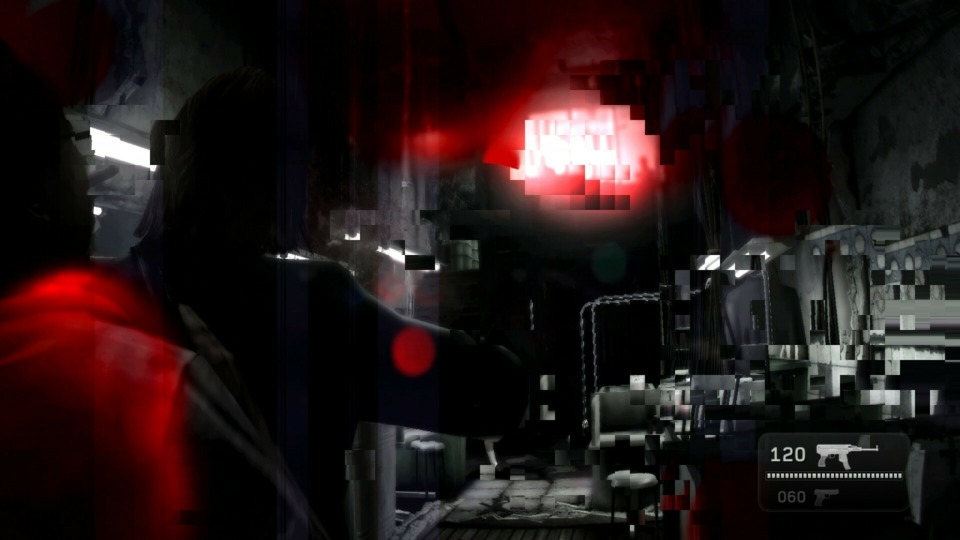
Just like the first game, Dog Days follows the two characters and their series of unfortunate events as everything goes from bad to worse and any possible good deed or person is either caught in the crossfire or is gone the moment this duo got within fifty feet of each other. This game’s story takes place a few years after the events of the first game, and this time it’s Lynch who takes the center stage. Lynch now lives in Shanghai and works for a crime organization. He is offered a weapons smuggling job, and he calls up Kane to help with the deal. The two hope this could be their final retirement job, but you know how that usually goes. In terms of comparing the two stories, Dog Days improves upon the issues I had with Dead Men by having the entire game take place in Shanghai over the course of two days, making the whole experience much more cohesive. Plus, I think the voice acting is better this time around and its Shanghai setting gives this game much more of a personality than the last one.
While the improvements are certainly welcome, this story doesn’t stray far from what makes the last game’s story great. Just like the last game, this is a dog-eat-dog world, and nothing any of the characters do is in any way likable or good. Kane and Lynch still aren’t friends (though props to Lynch for at least trying at the start of the game), and their alliance is solely held up by the fact that they need each other to survive. The few allies Lynch has either end up dead or they betray the two the second it became a slight inconvenience to be around them. The one person Lynch cares about, his significant other, ends up brutally killed, and he starts to lose it from there. The duo can’t go a few minutes without ending up in another gunfight, and any time they try to complete any deal peacefully it ends with death. The two are shot at, tortured, and ultimately end the game with them on an airplane leaving to somewhere. The only ally the two really have in this game is the cameraman following them, and even he doesn’t follow them on the plane, instead just dropping down to the ground when the plane leaves almost like he’s given up on life or is just too exhausted to keep following the two. Even as the game shifts from seedy back alleys and sweatshops to the upper floors of skyscrapers; the violence, muck, and trail of blood follows the two.
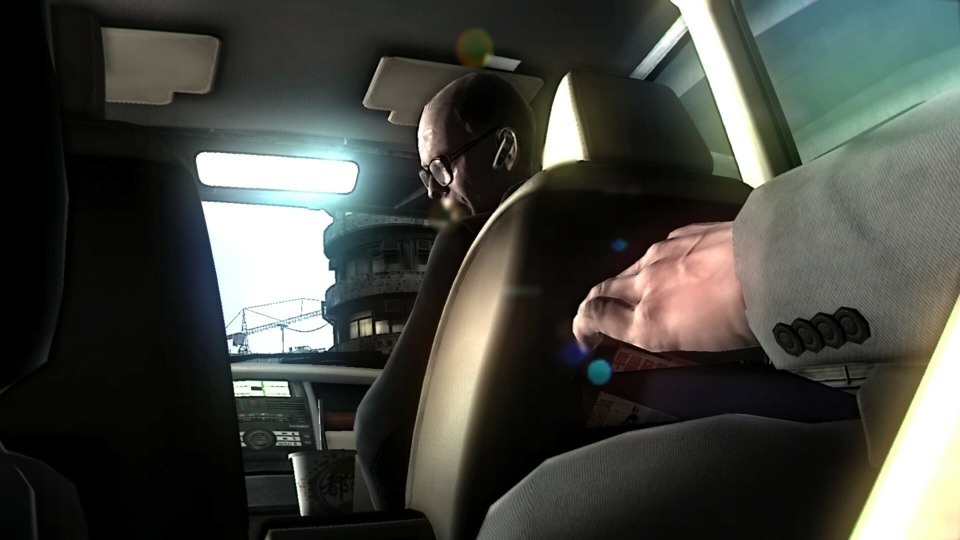
Similar to the scene of Kane’s wife dying in Dead Men, there is one scene that pops out to me in this game, and that is the beginning. After a simple job turned into a long shootout, the two end up cornering the man they were chasing down. He comes out of corner shooting at them, holding his girlfriend as a meat shield. Shots were traded back and forth, and only the girlfriends catches some of the bullets. Later in the story, the girl is revealed to be the daughter of a high ranking political officer, which is ultimately the cause for all of Kane and Lynch’s problems for the rest of the game. When the girlfriend died, the man pulled out a knife without any hesitation and slit his own throat. Much like Kane accepting his own wife’s death, this man found death to be the better option than dealing with the world they live in. For him, it was easier to simply give up and die than to try and run away or fight for his innocence because he knows that death will be better than whatever the men above him will do. This is why this series is so special to me. Many other games are about the scrappy underdogs fighting against a larger threat or at the very least fighting the good fight and not giving up, but not this game. Kane and Lynch don’t fight to win; they fight to survive, and in a world full of villains (including themselves), that is all they can do.
Just like the rest of the game, the combat is better this time around, but it still keeps true to Dead Men. Cover and reloading is now manual, shooting is a lot tighter, gas cans can be thrown and used as an explosive, there is a way wider range of weapons, weapons stay the same between levels which helps with cohesiveness, enemies can be used as meat shields, and there is a downed state mechanic where getting too much damage results in Lynch going downed, but he picks himself back up whenever. Combat is overall better this time around, but I also did have some issues with it. Bullets that hit humans show up as hit markers, which I think is a bit too gamey for this experience. Speaking of which, there are a couple of high-blockbuster moments like a chopper gunner scene that I think is antithetical to Kane and Lynch. There’s also some frustrating level design here-and-there to look out for, but overall I think the pros outweigh the cons.
While I normally like to focus on what is new and improved between different games, I think what they keep the same is more interesting. Just like the last game, combat here is rather featureless compared to other shooters. No collectibles, no xp, no upgrades, no arcade score, and so on. Just like the last game, there are civilians you run into, and this game allows you to kill them with no fanfare. Combat here isn’t meant to be enjoyed, It’s meant to be dealt with because it’s either the duo or them in a world full of villains. Just like the first game, it doesn’t want to gamify or glorify its violence. It doesn’t want you to celebrate your headshots, so the game pixelates them. No epic music plays as you dispatch members of the criminal underworld. In fact, the only music in the game I can recall is either songs played on the radio within the environments or disturbing, dark ambience, which only really played to the feeling of discomfort and insanity of the situation. Dog Days, just like the first game, wants you see where violence will lead, and where that path ends isn’t as fun, exciting, or rewarding as other shooters want you to believe.
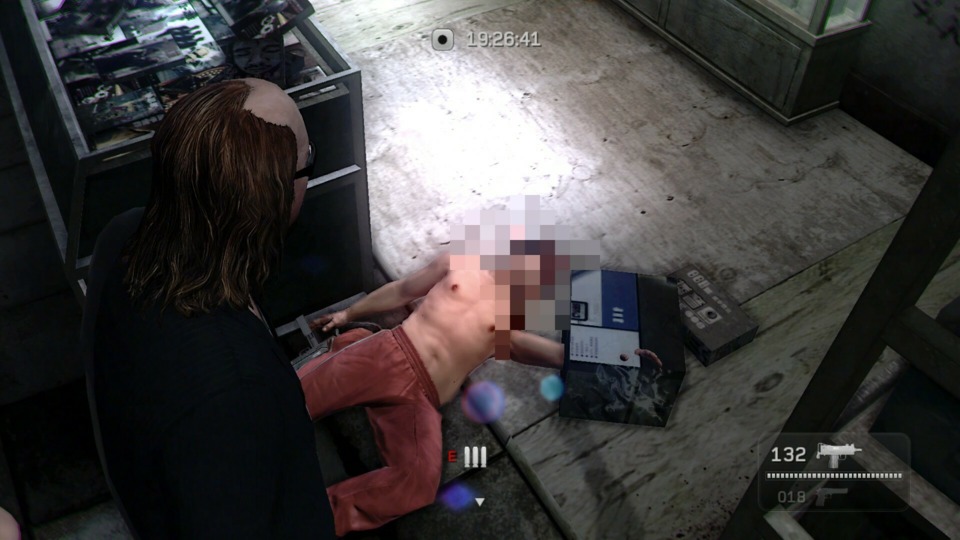
Despite not being a fan, the hit markers are one of the most interesting features I found with the combat, but my interest isn’t with shooting bag guys. In other games, a hit marker is a visual (and sometimes aural) indicator that you hit your target. Oftentimes, that target is your enemy, but what about people, creatures, or things that aren’t trying to kill you? This got me thinking about an infamous level in a franchise known for hit markers: the “No Russian” level from Modern Warfare 2. The original game didn’t have hit markers in the campaign, but the remastered version does include hit markers, and they are taken out in “No Russian.” One of gaming’s most infamous levels about purposefully killing innocent civilians believes hit markers aren’t meant for them. Dog Days, however, does have hit markers for civilian. Of course, a hit marker could mean different things to different developers, and there is a ten year gap between Dog Days and Modern Warfare 2 Remastered, but I think hit markers on civilians is significant. The game recognizes what you have done, but it won’t end the mission because that’s not how life works. The game is saying that to Kane and Lynch, shooting a civilian is no different than shooting an enemy. The game is saying that yes, you technically shot the wrong polygonal model, but tragedy and death doesn’t solely exist among the people with weapons in their hands, and whether or not the person you killed had a weapon in their hands or not, a hit marker is a hit marker, and a life has been ended either way. I think Modern Warfare 2 Remastered strengthens these notions, but even without it I think applying hit markers to civilians adds more weight to this screwed up world, even if I believe they gamify the experience a bit.
Both the last game and this one includes a multiplayer option that I just assumed dead, but Dog Days offers a side mode that can be played solo, so that I did. It’s called “Arcade Mode,” but in reality it is the offline version of their multiplayer mode called “Fragile Alliance.” How it works is you and seven others commit the same robbery over and over and try to make it to the escape vehicle each time, fighting cops and whoever you are robbing along the way. In between rounds, weapons can be bought. Where it gets interesting is with betrayals. Each wave gets harder, and less players means less money split among the group, so there are a few ways you can betray teammates. You can kill them, which will label you as a traitor, or you can pay the driver to leave early.
I think the mode plays well into the concept of this world having no friends or allies. Just like Kane and Lynch, these eight people aren’t friends, but acquaintances held together only by their cooperation for survival and will turn on you if the opportunity arises. Overall, though, I’m not a big fan of the mode. For starters, one of the things I like about this series is how it doesn’t gamify its violence, but this mode does. Another way this mode is antithetical to the main game is that this mode penalizes you for killing civilians, which is a weird thing to complain about, but I digress. Bots never turned whenever I played, so I didn’t really get the whole betrayal thing unless I initiated it. I also didn’t find much reason to betray because I didn’t really see any point to it. As far as I could tell, the level would just keep repeating until I died three times, so I guess the incentive for money would be in trying to get as much as I could before the game got too hard? If this mode had a set amount of rounds to reach and I was trying to have the most money by the end, then that would make sense, but whenever I played this mode I just tried to go as far as I could. I think the mode itself is really interesting, but I don’t think it belongs in this game, and I don’t think bots should fill in the shoes of the players.
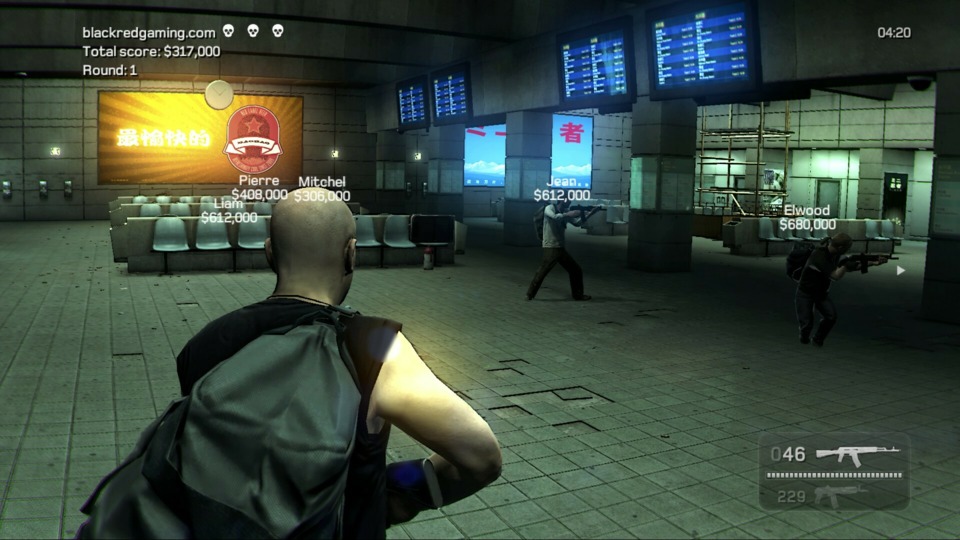
Much like how the rise of the Dog Star symbolized the start of a flood, the sign of Kane and Lynch reuniting in Dog Days is the sign of an upcoming flood of violence. I believe they do not want this violence, but they are forced into it for their survival similar to how the Egyptians were forced to used their flooding to grow their own crops. And much like how the Egyptians celebrated this flood, we the consumer celebrate this violence. Their hardships, pain, and struggle for survival is for our entertainment; their violence is necessary for us to feel justified in the purchase of this game. Unlike other shooters, however, this series is an example of a flood that is too large, causing me to think about violence in a different way. This isn’t to say it was too much for me to handle, but it did get me thinking about the brutish nature of violence in a way most other games wouldn’t want me to think about.
So to set aside the whole Nile River flood analogy and to wrap things up, the Kane and Lynch duology are two games that at surface level seem like mediocre shooters, but in reality have much more to show. These two games throw you into a pit and tell you to get out, but the bodies you pile onto each other in the hopes of escape only makes the pit deeper. It’s a nonstop barrage of death and despair, but where other shooters promise a light at the end of the tunnel, these games only offer more darkness. Spec Ops: The Line released around two years after Dog Days, and while these three games sacrifice gameplay for the sake of challenging the notions of being a shooter, I think this series commits more to its message. Dead Men and Dog Days are two shooters absolutely worth playing because more than anything else, you just don’t find a shooter quite like these two anymore.
Log in to comment